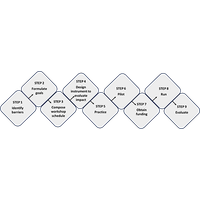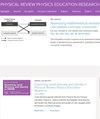Development, evaluation, and gender differences in a novel workshop intervention to narrow the physics gender gap at postcompulsory level
IF 3.6
2区 教育学
Q1 EDUCATION & EDUCATIONAL RESEARCH
Physical Review Physics Education Research
Pub Date : 2024-08-15
DOI:10.1103/physrevphyseducres.20.020109
引用次数: 0
Abstract
To address the issue of gender disparity in participation in the physics state matriculation exam, a novel school visit program was designed. The program was facilitated by undergraduate university students of physics and related courses who visited schools providing lower secondary education and delivered a single-session workshop including hands-on demonstrations of physics principles, presentations about famous female scientists, information on physics-related careers, and the importance of adopting a growth mindset. In this paper, we present a detailed description of the principles underlying the workshop’s design and its final outline. Participants’ responses to a pre-post questionnaire are analyzed to assess the immediate effects of the workshop, particularly as regards changes in their opinions about physics and students’ intention to study it for their state matriculation exam. Female and male responses are analyzed separately to establish differences in the intervention’s effect between the two genders. Results show an increase among female students with positive perceptions of their physics knowledge and familiarity with physics role models. Our attempt to boost confidence, enjoyment, and perceptions of the relevance of physics proved challenging but yielded some positive results. Strikingly, girls reported positive change in their ability to imagine themselves as physicists and their intention to study physics for their matriculation exam. The intervention was more successful among younger girls. Results obtained from boys were positive but to a lesser extent. The study demonstrates an encouraging and strong positive impact of a uniquely designed, single-session intervention, especially on adolescent girls, and contributes to research on the effectiveness of gender equality-oriented science outreach interventions.

为缩小义务教育后阶段物理学习中的性别差异而开展的新型讲习班干预措施的开发、评估和性别差异
为了解决参加物理州立预科考试的性别差异问题,我们设计了一项新颖的学校访问计划。该计划由大学物理及相关课程的本科生协助开展,他们走访了提供初中教育的学校,并举办了一次研讨会,内容包括物理原理的动手演示、著名女科学家的介绍、物理相关职业的信息以及采用成长型思维模式的重要性。在本文中,我们将详细介绍工作坊的设计原则和最终大纲。我们分析了参加者对事后调查问卷的答复,以评估研讨会的直接效果,特别是他们对物理的看法的变化以及学生在州预科考试中学习物理的意向。对男女生的回答分别进行了分析,以确定干预效果在两性之间的差异。结果显示,女生对物理知识的积极看法和对物理榜样的熟悉程度都有所提高。事实证明,我们试图增强学生的自信心,提高他们对物理的乐趣和相关性的认识,这种尝试具有挑战性,但也取得了一些积极的成果。令人吃惊的是,女生们报告说,她们在把自己想象成物理学家的能力以及在预科考试中学习物理的意愿方面都发生了积极的变化。干预措施在年龄较小的女生中更为成功。从男生那里获得的结果也是积极的,但程度较低。这项研究表明,一项设计独特的单次干预措施产生了令人鼓舞的积极影响,尤其是对少女产生了积极影响,并有助于研究以性别平等为导向的科学外联干预措施的有效性。
本文章由计算机程序翻译,如有差异,请以英文原文为准。
求助全文
约1分钟内获得全文
求助全文
来源期刊

Physical Review Physics Education Research
Social Sciences-Education
CiteScore
5.70
自引率
41.90%
发文量
84
审稿时长
32 weeks
期刊介绍:
PRPER covers all educational levels, from elementary through graduate education. All topics in experimental and theoretical physics education research are accepted, including, but not limited to:
Educational policy
Instructional strategies, and materials development
Research methodology
Epistemology, attitudes, and beliefs
Learning environment
Scientific reasoning and problem solving
Diversity and inclusion
Learning theory
Student participation
Faculty and teacher professional development
 求助内容:
求助内容: 应助结果提醒方式:
应助结果提醒方式:


